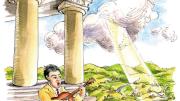1914
The Class of 1918—with 704 matriculants (up from 622 a year before)—moves into Gore, Standish, and Smith Halls, the new dormitories created by President Lowell as a way to plunge incoming students quickly into college life. The editors suggest the new dorms and scholarships have made the College more attractive, and also credit the past year’s efforts to publicize Harvard nationally.
1924
A number of “radical changes in policy and service have been made in Memorial Hall.” Instead of being charged board by the week, students may buy single meal tickets or six- or 30-day coupon books (breakfast is 35 cents, lunch 65 cents, dinner 75 cents). White waitresses will replace black waiters. And “for the first time in the history of the dining hall, women will be allowed at the transient tables” in the main dining hall, rather than being restricted to a private dining room.
1934
American Ballads and Folk Songs, compiled by John A. Lomax, A.M. ’07, and Alan J. Lomax ’34, with a foreword by Professor George Lyman Kittredge, is praised as evidence that the United States, “at least the part of the population which has not been trammeled by excess of schooling, is in fact a singing land.”
1939
A New York Times article headlined “Harvard Descends on Student Communists; Burns 5,000 Soviet-Hitler Pamphlets” prompts a swift reply from the Corporation denying destruction of the circulars; pointing out that the single student leafleter had simply broken a rule requiring distribution of printed matter by mail, not in person; and denouncing the article’s mention of an alleged “quiet drive by the University authorities against student communism” as “utterly incompatible with the well-known traditions of academic freedom in Harvard University.”
1969
The Harvard Independent debuts.
1999
A standing-room only crowd estimated at 1,500-plus (including students who slept on the steps to get a seat) hears the Reverend Billy Graham deliver a Sunday-morning sermon in the Memorial Church.
2004
Founded-at-Harvard website Thefacebook has been sued by rival ConnectU, founded by fellow Harvardians.
2014
To encourage undergraduates to relax, and avoid a disciplinary summons, Lamont Library and the Administrative Board distribute “Practice Safe Citing” squeeze balls at the start of fall term.








